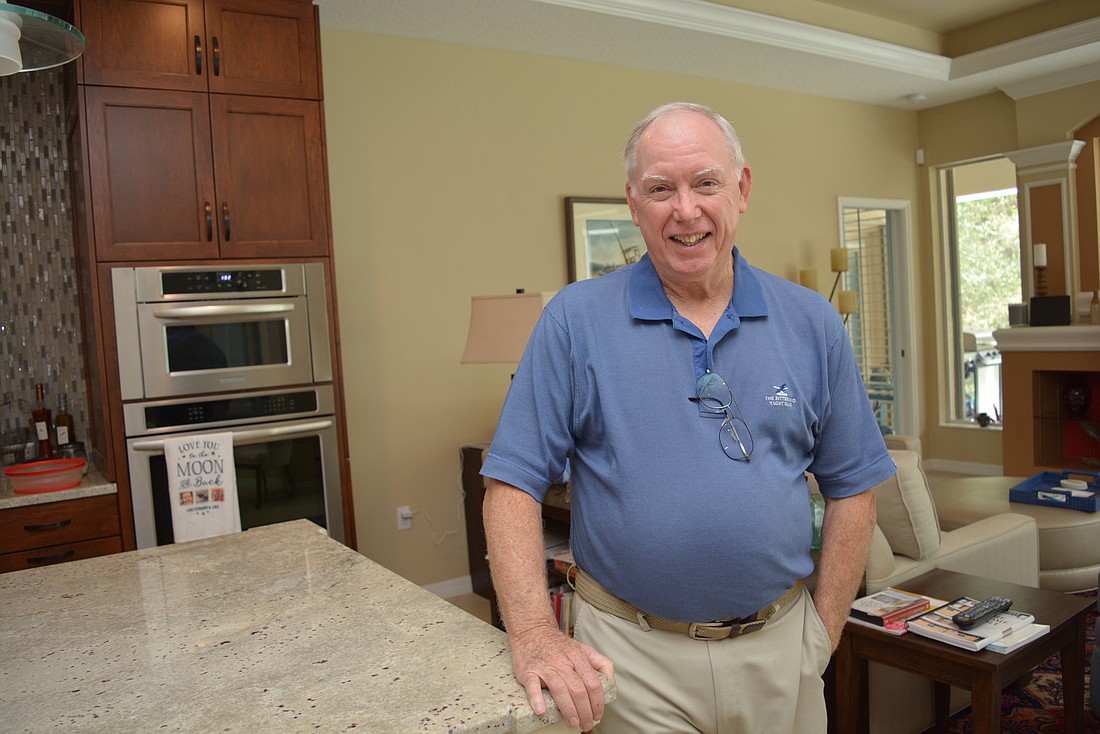- November 14, 2024
-
-
Loading

Loading

Getting out of a chair has become more complicated for Lakewood Ranch resident Dick Amesbury.
Sure, he’s getting older. At 73, he experiences some of stereotypical traits of aging, such as stiffness of the joints and forgetting things more frequently.
But Amesbury also knows his Parkinson’s disease might be at work. It is a progressive nervous system disorder that affects movement. Symptoms start gradually, sometimes with a barely noticeable tremor in just one hand, like he experienced in early 2006.
These days, the armchair in Amesbury’s living room or his office chair can be particularly troublesome because neither are anchored. He has to focus — body forward, weight shifted toward the front of his feet — to get up on the first try.
“The doctor always asks if I’ve had any falls,” Amesbury said. “Falls are potentially disastrous. If you hurt yourself and can’t exercise, the likelihood of falling again goes up.”
Amesbury said accepting his diagnosis is difficult, and he tends to blame things like stiffness for his struggles rather than Parkinson’s. Still, he knows he has to be mindful of his condition.
He was diagnosed just a month after retiring in early 2006. He initially had tried to ignore a tremor in his left hand, but he could not ignore it for long.
He and his wife, Eileen, began researching illnesses involving tremors, and soon Eileen made him an appointment with a physician at the Parkinson’s Center for Excellence in Houston, where they were living. After the appointment, Amesbury began dealing with his diagnosis of Parkinson’s disease.
“We set out on a path, trying to learn as much as we could,” Amesbury said.
Soon after moving to Florida in September 2006, the Amesburys became familiar with the Neuro Challenge Foundation for Parkinson’s, a local nonprofit dedicated to improving the quality of life of people with Parkinson’s and their caregivers.
Through monthly seminars and other Neuro Challenge resources, he became more aware of how his disease would impact his caretaker — Eileen — as well as the importance of exercise and keeping up to date on new medications available for treatment.
Amesbury said he feels fortunate his condition has progressed more slowly than for some others with the disease. He still gets around unaided by a walker or wheelchair. One doctor told him he would be fortunate to have a decent quality of life for five to seven years after his diagnosis, but it has been 13.
“I attribute that to some of the education I’ve gotten through Neuro Challenge,” Amesbury said.
On Feb. 29, the Neuro Challenge Foundation will host its annual Parkinson’s Expo at the Bradenton Area Convention Center, in Palmetto. The daylong event includes seminars related to Parkinson’s disease, product demonstrations and myriad resources to help people with Parkinson’s and their caregivers live well with the disease. Doors open at 8 a.m., and the expo begins at 9 a.m.
Seminar topics include “Nonmotor Symptoms of Parkinson’s Disease,” “10 Tips and Tricks for Living Well with Parkinson’s Disease” and “Planning for Ongoing Care and Support Before a Crisis.”
Amesbury said such events provide education and resources that are of great value to those with Parkinson’s and their caregivers.
He said life with Parkinson’s has caused him to make adjustments, but he takes life now one day at a time.
He still handles household chores along with volunteering on a committee for Habitat for Humanity of Manatee County, but he has slowed down. For example, he used to head Habitat’s board of directors but now serves on a committee and no longer works at the construction site.
Tasks that used to be simple for him, such as doing taxes, now require more focus and thought.
Through the Neuro Challenge Foundation and his physician, he understands exercise is critical to staying as healthy as possible, so he makes sure to exercise regularly, whether walking around Lake Uihlein near his home, riding his stationary bicycle or golfing about twice per week.
It also means doing a little exercise when getting out of a chair. Amesbury demonstrated how he swings his arms forward and comes to his feet then brings his hands up over his head before bending forward to reach for his toes. The coordinated movements are important for those with Parkinson’s. Amesbury said he does such movements regularly to help ensure he has toned muscles and keeps good motor skills.
“I think you can counteract it some,” he said of Parkinson’s.